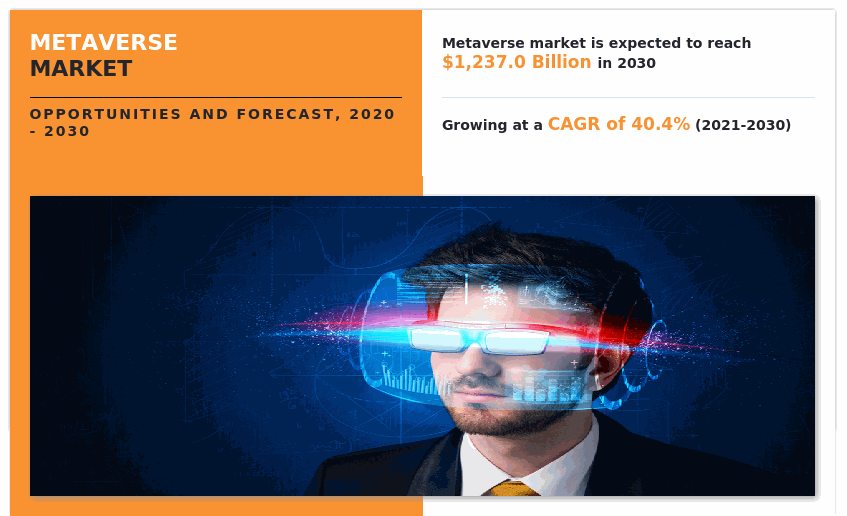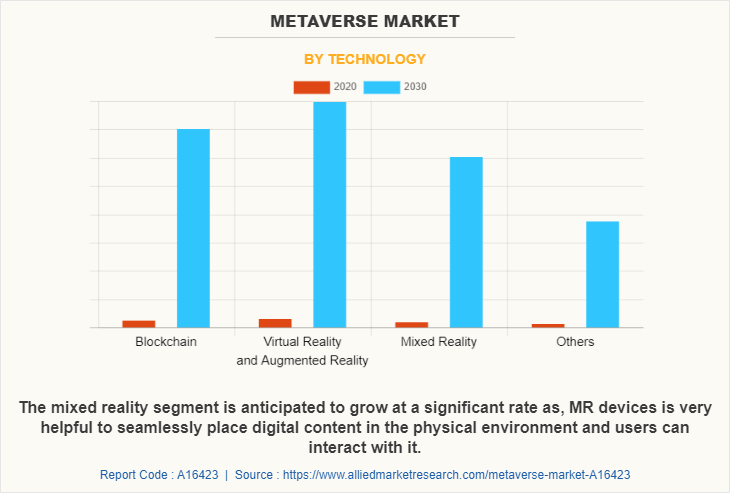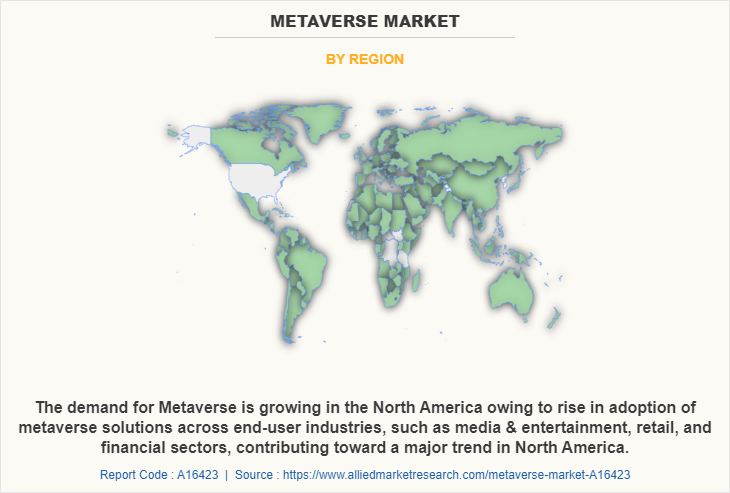Metaverse Market Overview
The global metaverse market size was valued at USD 41.9 billion in 2020, and is projected to reach USD 1,237.0 billion by 2030, growing at a CAGR of 40.4% from 2021 to 2030. Rise in demand for work from home and remote working tools during the period of the COVID-19 pandemic led to growth of the global market. Growth in popularity of cryptocurrencies and non-fungible tokens (NFTs) positively impact the metaverse market growth. A positive drive toward decentralized network technology is expected to offer remunerative opportunities for expansion of the market during the forecast period.
Key Market Insights
- By technology, the mixed reality segment is expected to witness highest growth in the upcoming years.
- By industry vertical, the media and entertainment segment generated the highest revenue in 2020.
- Region wise, Asia-Pacific is expected to witness significant growth during the forecast period.
Market Size & Forecast
- 2030 Projected Market Size: USD 1,237.0 Billion
- 2020 Market Size: USD 41.9 Billion
- Compound Annual Growth Rate (CAGR) (2021-2030): 40.4%

What is the Metaverse
Metaverse platforms are a network of three-dimensional (3D) virtual environments centered on social interaction and communication. Metaverse platforms are frequently portrayed in futuristic and science fiction as a potential iteration of the Internet as a single, worldwide virtual environment made possible by the usage of virtual reality and augmented reality headgear. Such advancements in metaverse technology are expected to contribute toward development of the metaverse industry in the coming years.
Metaverse Market Segment Review
The metaverse industry is segmented on the basis of component, technology, application, industry vertical, and region. On the basis of component, the market is divided into hardware, software, and service. Depending on technology, it is classified into blockchain, virtual reality & augmented reality, mixed reality, and others. On the basis of application, it is segmented into gaming, online shopping, content creation & social media, events & conference, digital marketing, testing & inspection, and others. By industry vertical, it is divided into BFSI, retail, media and entertainment, education, aerospace & defense, automotive, and others. Region wise, it is analyzed across North America, Europe, Asia-Pacific, and LAMEA.
Depending on technology, the virtual reality and augmented reality segment dominated the metaverse market share in 2020, and is expected to continue this trend during the forecast period, owing to growing demand for virtual reality (VR) / augmented reality (AR) based services. However, the mixed reality segment is expected to witness highest growth in the upcoming years, owing to the rise in popularity of mixed reality games and social platforms.

Region wise, the metaverse industry was dominated by North America in 2020, and is expected to retain its position during the forecast period, owing to its high concentration of metaverse technology vendors such as Meta Platforms, Inc. (formerly known as Facebook, Inc.) and Roblox Corporation, which is expected to drive the market for metaverse technology within the region during the forecast period. However, Asia-Pacific is expected to witness significant growth during the forecast period, owing to rapid economic and technological developments in the region, which is expected to fuel the growth of metaverse solutions in the region in the coming few years.

The report focuses on growth prospects, restraints, and analysis of the global metaverse market trends. The study provides Porter’s five forces analysis to understand the impact of various factors, such as bargaining power of suppliers, competitive intensity of competitors, threat of new entrants, threat of substitutes, and bargaining power of buyers on the global metaverse market.
Top Impacting Factors
The Rising Popularity of Virtual Tokens and NFTs
- In recent years, non-fungible tokens or NFTs have gained major growth and endorsements. Rise in popularity of virtual goods and digital currencies among younger generation (millennials and gen Z) aids in growth of NFTs. According to a report published by the American news media house – CNBC in March 2022, total number of NFT trades accounted for over $17.6 billion, which was a 210.00% increase from 2020 to 2021. Such instances propel growth in popularity of virtual goods and currency in the modern digital landscape, which propels the global metaverse market.
Work from Home and Remote Working Tools
- With rise of metaverse platforms, users have found an innovative way of socializing with people from across the globe in fictional world and hanging out in a virtual worlds with limitless possibilities. Metaverse can provide tools to deal with current challenges associated with remote working and work from home. Metaverse can give businesses and organizations a virtual environment in which they can meet and manage their employees, communicate with them, read their body language, and maintain in-person engagement while being remote. Furthermore, by keeping track of the team inside a virtual office, employers can handle issues such as time theft at the workplace. Such applications of metaverse platforms in modern workplaces aid in growth of the metaverse market.
What are the Leading Companies in Metaverse
The following are the leading companies in the metaverse market.These players have adopted various strategies to increase their market penetration and strengthen their position in the industry.
- Alibaba Group Holding Limited
- Antier Solutions
- ByteDance Ltd
- Facebook, Inc.
- Huawei Technologies Co. Ltd.
- Nextech AR Solutions Inc.
- NVIDIA Corporation
- Roblox Corporation
- Shenzhen Zqgame Co., Ltd
- Tencent
- Unity Technologies.
What are the Key Benefits for Stakeholders
The study provides an in-depth analysis of the global metaverse market forecast along with current & future trends to explain the imminent investment pockets.
Information about key drivers, restraints, & opportunities and their impact analysis on global Metaverse market trend is provided in the report.
Porter’s five forces analysis illustrates the potency of the buyers and suppliers operating in the industry.
The quantitative metaverse market analysis from 2021 to 2031 is provided to determine the market potential.
Metaverse Market Report Highlights
| Aspects | Details |
| By Component |
|
| By Technology |
|
| By Application |
|
| By Industry Vertical |
|
| By Region |
|
| Key Market Players | Antier Solutions, Facebook, Inc., Roblox Corporation, NVIDIA Corporation, Unity Technologies, Tencent Holdings, ByteDance Ltd, Huawei Technologies Co. Ltd., Alibaba Group Holding Limited, Nextech AR Solutions Inc., Shenzhen Zqgame Co., Ltd |
Analyst Review
Demand for metaverse platforms has been on a rise for past few years and the market is expected to continue this trend in the coming years as well, owing to growing trends toward web 3.0 and increase in penetration of AR/VR technology, which are enabling the development of metaverse based applications that can help provide an immersive and engaging social experience, without having the user to leave the confines of his/her home. Moreover, increasing advancements in blockchain technologies are proving beneficial for development of metaverse technology. In addition, growing digital and internet penetration in many regions of the world are promising new opportunities for growth of the metaverse market.
Key providers of the metaverse market such as Facebook, Inc, NVIDIA Corporation, and Unity Technologies account for a significant share of the market. With larger requirements from metaverse, various companies are establishing partnerships to increase metaverse capabilities. For instance, in March 2022, NVIDIA Corporation announced a partnership with The Kroger Co. to reimagine the shopping experience using AI-enabled applications and services. Under this partnership, Kroger and NVIDIA will leverage NVIDIA AI Enterprise software suite for retail, NVIDIA Omniverse™ Enterprise to build digital twin simulations and NVIDIA cuOpt to explore logistics optimizations.
In addition, with increase in demand for metaverse, various companies are expanding their current product portfolio with increasing diversification among customers. For instance, in October 2021, Unity Technologies, a video game software development company based in San Francisco, California announced the launch of their Unity Metacast, an innovative new platform that leads to real-time 3D (RT3D) evolution for professional sports. Unity Metacast is an RT3D sports platform used to create and deliver interactive content, direct to the consumer.
Moreover, market players are expanding their business operations and customers by increasing their acquisitions. For instance, in December 2021, American footwear company- Nike announced acquisition of virtual sneaker design studio - RTFKT Inc. With this acquisition Nike aims to broaden its presence in the popular metaverse platform by selling limited-edition virtual footwear products for user’s virtual avatars on metaverse platforms.
The global metaverse market size was valued at $41.89 billion in 2020, and is projected to reach $1,236.99 billion by 2030.
The global metaverse market is projected to grow at a compound annual growth rate of 57.2% from 2021-2030 to reach USD 21,954 million by 2030
The global metaverse market size is dominated by key players such as Alibaba Group Holding Limited, ByteDance Ltd, Facebook, Inc., Huawei Technologies Co. Ltd., Nextech AR Solutions Inc., NVIDIA Corporation, Roblox Corporation, Shenzhen Zqgame Co., Ltd, Tencent, and Unity Technologies. These players have adopted various strategies to increase their market penetration and strengthen their position in the industry.
The largest regional market for the metaverse is North America.
The COVID-19-driven demand for remote work tools and the rise of NFTs and cryptocurrencies are the metaverse market growth driving factors.
Loading Table Of Content...



